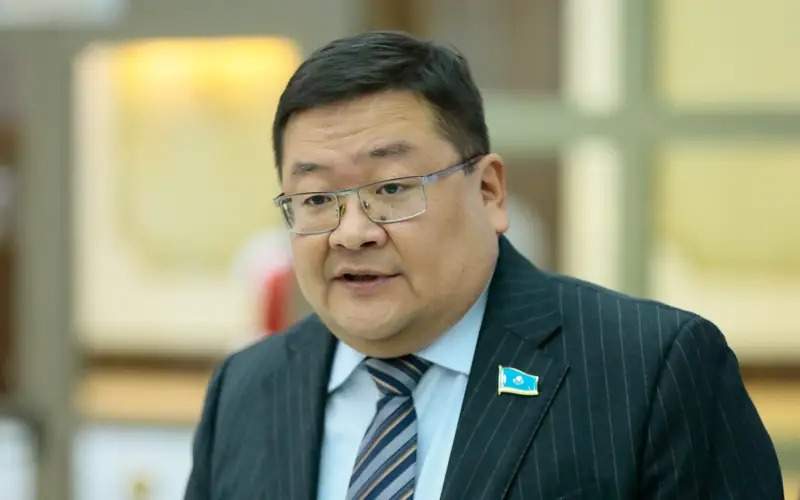"Solomonic decision" – experts on transferring black boxes to Brazil
Majilis deputy Aidos Sarym shared his opinion with a Kazinform News Agency correspondent, stating that the decision to transfer the flight recorders to Brazil was made to ensure absolute transparency and objectivity in the investigation.

Previously, it was reported that Kazakhstan would send the black boxes of the AZAL plane, which crashed near Aktau, to Brazil’s Center for Investigation and Prevention of Aeronautical Accidents (CENIPA). The investigation of the air crash is under the personal control of the Head of State.
Majilis deputy Aidos Sarym believes that sending the black box to Brazil for decoding and analysis was the only correct decision.

“This can be considered a "Solomonic' decision since the affected party is Azerbaijan and the majority of the passengers were their citizens. Azerbaijan’s President has repeatedly stated that Russia is at fault in this situation. He has also expressed concerns about trust in certain CIS structures that previously investigated international accidents. To ensure complete transparency and objectivity, the investigation and decoding were entrusted to Brazil. This will help determine why the tragedy occurred and who is responsible, leaving no room for distrust from any party,” commented Aidos Sarym.
He added that Brazil has a vested interest in conducting an objective investigation, as it is the manufacturer of the Embraer aircraft involved in the incident. Furthermore, the deputy emphasized the importance of objectivity in the investigation, as six Kazakhstani citizens lost their lives, and CENIPA is well-equipped to handle this task.
Political analyst Gaziz Abishev also commented on the issue in his Telegram channel:

“The decision to hand over the black boxes of the crashed plane to the Aeronautical Accidents Investigation and Prevention Center (CENIPA) by Kazakhstani authorities, is a principled step aimed at neutralizing external pressures and ensuring an impartial decoding process, earning public trust. It seems that President Tokayev, after discussions with Presidents Aliyev and Putin, and acting as an unbiased mediator in the tense conflict between Russia and Azerbaijan, concluded that this decision is the most probable path to a fair resolution. It will be appreciated by institutions and international communities alike,” wrote Gaziz Abishev.
It is worth noting that the CENIPA Center is equipped with the necessary technical capabilities, advanced equipment, and certified laboratories for reading flight recorders.
A black box, or flight recorder, is a specially protected device that records and stores critical flight and operational parameters of an aircraft, as well as conversations in the cockpit. In the past, these components were housed in two separate devices, but now combined models are available. However, aviation regulations require two such combined recorders to be onboard.
Black boxes are designed to withstand extreme conditions. Before they are approved for use, they undergo rigorous testing, including:
- Impact against a concrete wall at 750 km/h.
- Sustaining pressure of 2.25 tons for at least five minutes.
- Withstanding temperatures up to 1,100°C for at least one hour.
- Remaining functional underwater at depths of up to 6,000 meters.
The cockpit voice recorder captures all sounds in the cockpit, including pilot conversations, instructions from the flight computer, communication with ground services, and announcements to passengers. Additionally, it records background noises, switch clicks, and engine sounds. Only the last 120 minutes of conversations are stored, as older data is automatically overwritten.
The volume of data stored on black boxes has increased significantly. Modern recorders capture hundreds or even thousands of parameters, including flight trajectory, altitude, speed, engine performance, and temperature of exhaust gases.
Kazakhstan ratified the Convention on International Civil Aviation (“Chicago Convention”) in 1992 and is a member of the International Civil Aviation Organization (ICAO).
According to Annex 13 of the Chicago Convention, the state conducting the investigation decides where the flight recorders will be read and decoded. Under Article 26 of the convention, the state where the accident occurred is obligated to investigate the incident, adhering to ICAO procedures within the limits of national legislation.
On December 25, an Azerbaijan Airlines (AZAL) plane en route from Baku to Grozny crashed near Aktau, Kazakhstan. The aircraft carried 67 people, including five crew members. The crash claimed the lives of 38 passengers, while 29 survived.
A government commission was established by Kazakhstan to investigate the causes of the crash. The transport prosecutor of Mangystau Region, Abylaibek Ordabayev, confirmed the recovery of the black boxes at the crash site.
Kazakhstan’s President Kassym-Jomart Tokayev held a meeting regarding the crash and commended the high level of rescue operations conducted. Azerbaijani President Ilham Aliyev thanked Kazakhstan for saving those injured in the accident, noting that Kazakhstani rescuers risked their lives during the operation.
